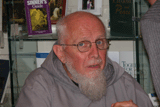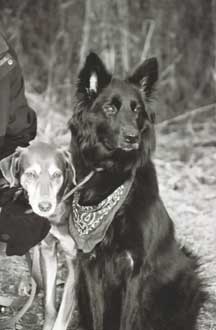Hello, everyone --
This is my first post after a long absence. I've been back in the country for about three weeks after being in the Middle East for almost all of 2003, on a goodwill tour with the U.S. Marine Corps. It's good to be back to see my wife, children (one more arrived while I was away), home, etc., and it's good to be able to write things here once again.
I've thought of many things to comment upon, but I wanted to begin with one topic that's been troubling me for some time. A couple of weeks ago, PFC Jessica Lynch went home after months of physical therapy. For those of you who haven't watched the news this year, PFC Lynch is the U.S. soldier injured in an attack on her convoy in Nasiriyah, Iraq, on March 23. Initially, reports based on intercepted Iraqi radio transmissions said that she fought her attackers, but later evidence revealed that she was almost certainly unable to fight because of the massive injuries she suffered in her vehicle's collision.
So you probably know who Jessica Lynch is; you probably know that she has received a Bronze Star medal, as well as magazine covers, offers of exclusive, in-depth interviews, and all the attendant glories of saturation-level media coverage. She has a boyfriend who is a sergeant (in violation of Army fraternization rules). Her recovery looks like it will be complete.
I don't wish PFC Lynch ill -- quite the opposite. I was in Nasiriyah when special forces teams stormed the hospital where she was being kept, and as we knew the raid was imminent, I prayed for her safety. Our task force carried out an attack to divert attention away from the Lynch rescue. My civil affairs team, attached to 2nd Battalion, 8th Marine infantry regiment, contributed to the intelligence that identified her location. (Several civilians came forward to tell us where she was being kept, and Marines on my team found evidence of her previous location which indicated that she was still alive. I had nothing to do with these efforts, as I happened to be carrying out other duties when these things happened.)
What bothers me isn't that she's famous. What does bother me is that two Marines laid down their lives trying to save her and her comrades, and nobody knows who they are. I don't even know their names, though I've spent a considerable amount of time trying to figure it out. They are two of the nine Marines who died on that sunny, mild day, but none of the news accounts or Pentagon reports that I've seen mention how each one died. Perhaps they think it's not important; I happen to think it is. The only reason I heard about them at all is because of two news stories that mentioned in passing that two Marines died while trying to get to Lynch's convoy, where several soldiers were dead or seriously wounded.
They were young men racing to the assistance of their countrymen, plunging themselves into imminent danger along with dozens of others. Unfortunately for them and their families, they were unlucky enough to be in the path of a bullet or the blast radius of a mortar shell. "Greater love has no man than this, that a man lay down his life for his friends," Jesus said. These men gave their lives for complete strangers. And nobody knows their names.
It's possible that those news reports were wrong, though I did talk to Marines with that battalion who confirmed the details. Even if they are wrong, there were nine Marines and several soldiers who perished the same day. They weren't "news," though -- it's not counterintuitive for a 19-year-old guy from Brooklyn to die in battle. A pretty, wholesome-looking blond girl from a rural town makes for a much better profile in People magazine, and it has the novelty factor going for it. Also, news editors -- almost all of whom are parishioners at the Church of Diversity Uber Alles -- adore story lines involving women doing activities that men used to monopolize. From the moment the Iraqis dragged Lynch's unconscious body away from her wrecked Humvee, she was destined to be a media star.
This speaks volumes about our culture: the mass media not only have a warped sense of proportion and values, so do large numbers of media consumers as well; the media know their market, and they know lots of people are interested in stories like Jessica Lynch.
A part of my motivation is because on a few occasions during the battle for that city, my team could have met the same fate. Mainly, though, I believe at least some of the glory given to Lynch rightfully belongs to others, too. So if you know the names of the two Marines who died while rescuing that convoy, let me know. I'd like to pray for their souls by their names, and for their families.










